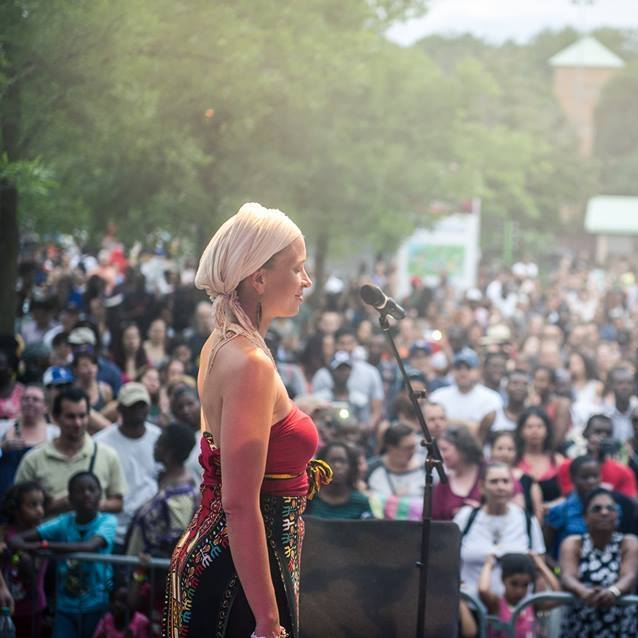HISTORY
Racine Croisée organizes as part of its annual program conferences, training and cultural events for the general public, the most relevant in terms of intercultural relations and living together are as follows:

Racine Croisée organizes as part of its annual program conferences, training and cultural events for the general public, the most relevant in terms of intercultural relations and living together are as follows:


It takes place in Montreal, It is the biggest cultural event organized by Racine Croisée, in the first weeks of August. It promotes the intercultural rapprochement of the diversity of Montreal’s cultural expressions. We aim to strengthen the momentum of solidarity within communities in through awareness raising on the harmful effects of intolerance, discrimination and racism.
Its program composed of traditional songs and dances, tales from here and elsewhere, fun activities as well as the demonstration of the culinary art highlight the denunciation of these scourges by inciting festival-goers to become aware, in order to see the need for mutual aid and mutual support which promotes “living together”.
The origin of this festival draws from the Ngondo, a traditional and ritual festival of the Cameroonian coastal peoples. It brings together the Sawa peoples of the Littoral region (Douala) during the first week of December. Like all migrating people, the Sawa ardently expressed the desire to assert themselves culturally in their host territories, but the realization of this desire is not without difficulties.
The Ngondo arrived in Canada on the initiative of a group of immigrant sawa women in Canada, based in Montreal, driven by a desire to represent their culture and maintain ties with their country of origin. In 2006, under the leadership of Agnès Moume Eyoum, these ladies set up the association of sawa women of Montreal.
This association has grown by attracting the support of a large number of people. The association became, moreover, Solidarité Sawa, a non-profit organization, bringing together men and women from all walks of life, but with limited activities within the sawa community of Montreal.
Agnès Éyoum, aware that there is still a lot of work to be done in terms of the advancement of their organization, launches a vibrant appeal to the Sawa based in other provinces of Canada to involve them in her various projects, the most of which are important was the organization of an Ngondo festival in Canada.
Created in 2009, the Afromonde Festival now attracts a much larger audience, including all cultures of the world. Through this festival, Racine Croisée has the merit of bringing together different ethnic groups, of facilitating encounters between artists and peoples through its programming.
The karnavalesque parade is the moment when all the cultural communities represented at the festival, by men, women, young and old, dressed in their traditional costumes and many other identity accoutrements, are called to make a march of about 5 km.
It is a costumed and drummed parade where traditional songs and music from each represented culture are sung. This is an important manifestation


It is an exceptional concept of music and art which is intended to be a moment of “living together”, a meeting of different music and rhythms of the world and of art in all its forms. du monde wonderfully promotes social cohesion and intercultural understanding We are currently in our 6 th edition.
Rhythm is a very popular type of music in Africa. It is soukous-like, with more bass and brass, with significant influences from jazz, ambass bay, latin music, highlife rumba, salsa. This urban music is one of the main rhythms such as bikutsi, mangambeu and siko and has the meaning of “moving the hips”, “stripping the body” 1.
Makossa has experienced a remarkable boom in the world since the 1960s. It has long dominated the African music scene. Internationally renowned artists who popularized Makossa are among others André Marie Talla, Pretty, Hit international ‘Soul Makossa’.
The new generation is coming to us with Rappe-Makossa Franco, Wax Dey Makossa Challenge, a mix of afro pop and Makossa Bachata Makossa. Outside the continent of Sub-Saharan Africa Michael Jackson “Salsa Makossa”, Shakira “Waka Waka Remix”, Rihanna and many more.
This intercultural project aims to facilitate the social integration of young immigrants through intensive and interactive training focused on the development of socio-professional skills and a better knowledge of the Montreal and Quebec environment. This project also aims to promote intercultural exchanges. Several activities will be carried out in this context: workshops, seminars, visits to neighborhoods and cultural institutions. This program brings a new dynamic, another way to promote and celebrate leadership among young women and imminent personalities in Quebec.
The relevance and importance of the “Leaders and Personalities” program is well established. Present on the Montreal scene for four years, this program has left its mark on the young participants. In addition, it is gradually rising on the list of events of choice for the Montreal public.
Racine Croisée, through this project, helps to promote the image of Montreal as a multicultural metropolis, a place par excellence for expressions of cultural diversity. At the end of each edition, we organize an evening of expression to allow young leaders and personalities to offer the general public intellectual and artistic performances in a program rich in color.
The activities carried out within the framework of this project are :
Aid and food distribution are carried out entirely by volunteers from the constituency. It involves collecting food and distributing it to food counters where low-income people can get it once a week. During the distribution sessions, meals are cooked to feed the needy, students and others who cannot afford a large meal.
This collective cooking activity allows the populations concerned to get to know each other and share their knowledge in the field of culinary art. It is an activity which considerably accentuates intercultural rapprochement, sometimes even going beyond our expectations. We assist over 90 families and 40 to 50 students per week.
It is a culinary activity that is part of the gastronomic heritage of Sub-Saharan Africa. Its specialties are braised seafood and chicken with exotic flavors. This activity began in the parks of Montreal in 2004, under the names of “Festival Poissons Braisés”, “BBQ Poissons Braisés”.
At the request of customers and gastronomic promoters, it is now touring the major food festivals. This is how its flavors give it a place among the general public.
The immigration component offers reception and settlement services with a view to pluralistic initiatives with the aim of promoting an integrated and socially cohesive society. In this context, the organization, made up of volunteers, is dedicated to welcoming a mixed clientele from various countries of the five continents.
At the end of our 2018 activities, we welcomed 31,035 people distributed as follows: